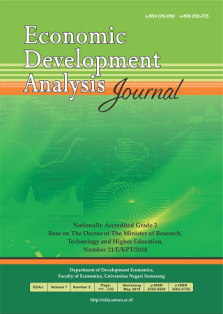Tourism Development and Economic Growth: An Empirical Investigation for Indonesia
Abstract
This paper applies the panel technique to investigate relationships between tourism development and economic growth in Indonesia (including 33 provinces) for the 2011-2021 period. The research method used the Solow growth model with Harrod Neutral approach and derived into the econometrics model by Fixed Effect Model (FEM) with the gross regional domestic product as a dependent variable and proxied of economic growth. Independent variables include gross fixed capital formation as proxied of capital, labor, and tourism indicator. The tourism indicator is measured the average length of total guests, domestic guests, and foreign guests in the classified hotel. Using FEM, the result showed that gross fixed capital formation, labor, and the average length of domestic guests significantly positively affect economic growth. The other, the foreign guest has no significant effect on economic growth. Additionally, tourism development has a more significant impact on economic growth from domestic guests than from foreign guests. Finally, the panel analysis shows a significant effect of the modeling, especially tourism indicator, to promote economic growth in 16 provinces in Indonesia. Thus, our empirical findings have significant policy implications for supporting tourism development in all provinces for growing economic highly.


